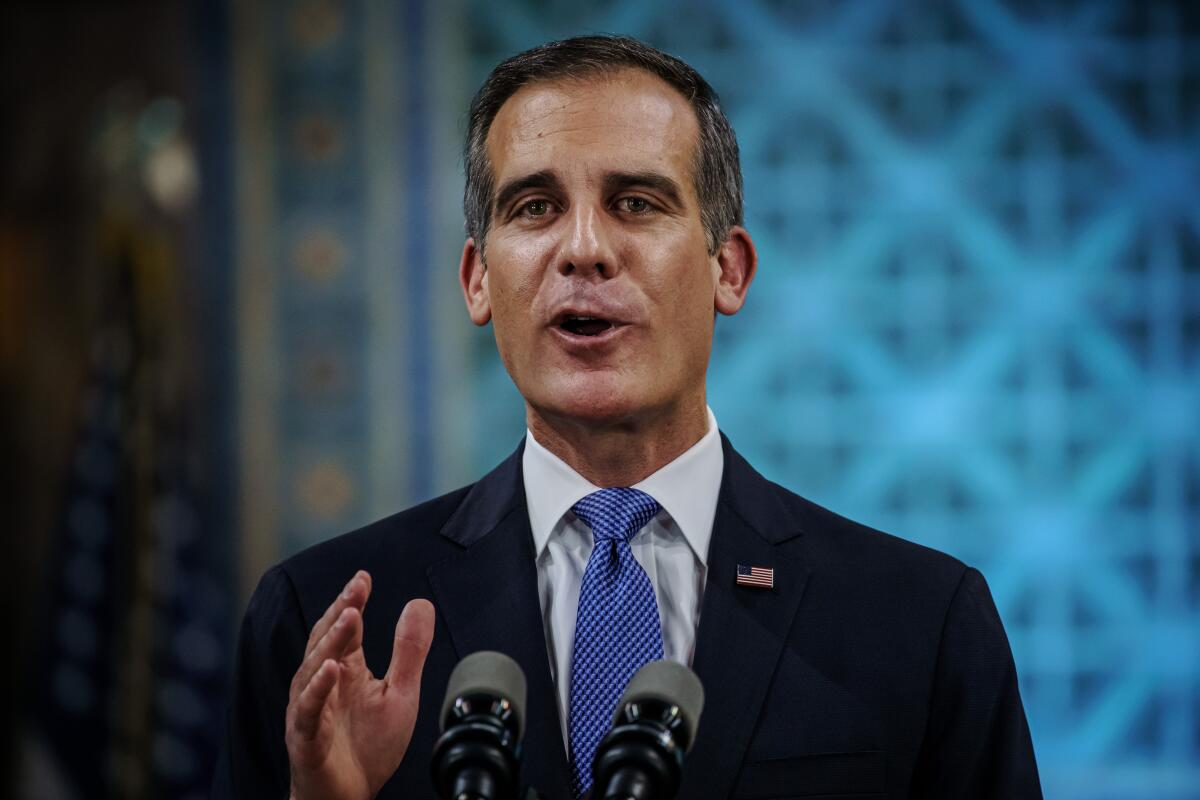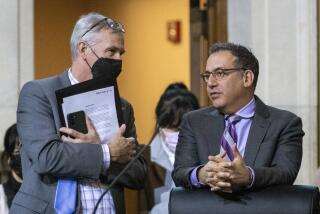Street repairs, tree trimming, graffiti removal face cuts under Garcetti budget plan

Los Angeles Mayor Eric Garcetti unveiled a $10.5-billion budget for the city Monday that imposes cuts across an array of city agencies, with nearly 16,000 city workers being furloughed in response to the economic fallout from the coronavirus outbreak.
Garcetti’s proposed spending plan for the fiscal year starting July 1 is expected to result in fewer street repairs, fewer trees trimmed and longer wait times for the city’s 311 public services hotline. Graffiti removal, neighborhood councils, gang intervention programs and various infrastructure projects are also on track to have less money in the coming fiscal year, aides to Garcetti said.
The city’s financial analysts are expecting revenues will rise just 1.8%, compared with the 4.5% average yearly growth seen by the city over the last six years.
Garcetti said expenses have outstripped the city’s modest revenue growth, triggering the need for cuts. He is also seeking an infusion of federal funds, both to cover the city’s emergency costs and to help the city rebound from the economic downturn.
If those funds do not arrive and the city revenues taper off even more, “there may be further cuts and there may be even deeper things that we have to do with our city services and our workforce,” Garcetti said.
The mayor released his budget a day after he provided a grim forecast for the coming year, warning residents during his State of the City address that the downturn would be worse than the 2008 recession.
With businesses shut down across the region, taxes and fees have been coming in well below the city’s previous projections, leaving city leaders with fewer dollars to pay for police officers, firefighters and other basic services.
Sales tax, for instance, is expected to come in at $557 million in the coming year, compared with previous projections of $635 million.
In a remarkable State of the City address, Mayor Eric Garcetti said L.A. is “under attack” from the coronavirus, with its daily life “unrecognizable.” He said major cuts would be needed.
To get through the current fiscal year, city leaders are planning to tap $190 million from the reserve fund — money set aside for emergencies. And to close the gap for 2020-21, Garcetti is planning to impose furloughs on nearly 16,000 civilian city workers, saving $139 million, Garcetti’s financial advisors said Monday.
Those employees would experience a 10% reduction in pay in the coming fiscal year. But many others would be spared.
Furloughs will not be required of police officers, firefighters, sanitation workers, librarians and staffers at the Department of Building and Safety, which processes construction permits and inspects new and existing buildings.
Still, one city union warned the furloughs would have far-reaching consequences, affecting police investigations, city attorney cases and other activities.
“Our members identify fingerprints retrieved from crime scenes, coordinate cargo ships and services to manage the Port of L.A. ... and process paperwork for all city related functions,” the American Federation of State, County & Municipal Employees District Council 36 said in a statement to The Times.
In the short term, it’s not clear how much Angelenos will be affected by the reductions. Because of stay-at-home orders, hundreds of city facilities are closed to the public and it’s not certain when they will reopen. Many city employees have been reassigned to coronavirus testing sites and recreation centers operating as makeshift homeless shelters.
Garcetti’s budget calls for $430 million for programs to address homelessness, a 6% drop compared with the current year. Although the spending plan will increase the overall budget of the police and fire departments — deemed essential by the mayor and other city leaders — those two agencies will still have thousands of civilian employees placed on furlough, a Garcetti aide said.
That approach has drawn criticism from some activists who want the mayor to move money out of the Police Department and into other services, such as free meals and affordable housing. The LAPD consumes more than half of the general fund, the portion of the city budget that pays for core services.
“It’s really frustrating to never see the police budget being questioned,” said Jacob Woocher, a member of the Los Angeles Tenants Union, which has been staging protests outside Garcetti’s residence in Windsor Square.
Mike Eveloff, a board member with the advocacy group Fix The City, took a sharply different view, saying city leaders need to focus on public safety, including police, firefighters and the safe operation of the city’s newly opened homeless shelters.
“Whatever cuts they have to make to keep police and fire staffed, they’ve got to do it,” he said.
Los Angeles is not just facing lower-than-expected tax revenues, but also a series of new and expensive financial obligations in the coming fiscal year.
Under contracts negotiated by Garcetti and the council, firefighters are on track to receive a 4.75% increase in July. Police officers are scheduled to receive two raises — 1.5% in July and another 3.25% in January. And many civilian city employees will see two raises of 2%, one in January, the other the following June.
Even before the coronavirus outbreak, city department heads had been asked to come up with budget cuts and savings in response to the growth in labor costs.
Garcetti said Monday that furloughs will achieve “much more savings” than asking unions to postpone their pay increases until a future year. While furloughs can be imposed unilaterally, it’s unlikely that pay raises could be postponed without reopening negotiations with employee unions, one mayoral aide said.
Councilman David Ryu, who represents a district stretching from Silver Lake to Sherman Oaks, said the proposed reductions make it essential for the city to secure federal funding in the coming months. Without federal assistance, furloughs will have a “ripple effect” across the region’s economy, he said.
“The city’s workforce has been on the front lines of this crisis, and Washington must make it a priority to support these workers,” he said in a statement.
More to Read
Sign up for Essential California
The most important California stories and recommendations in your inbox every morning.
You may occasionally receive promotional content from the Los Angeles Times.













